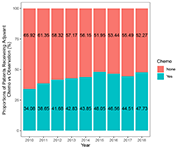Effectiveness of adjuvant chemotherapy for elderly patients with triple-negative breast cancer
DOI:
https://doi.org/10.17305/bjbms.2022.8163Keywords:
Adjuvant chemotherapy, observation, triple-negative breast cancer, geriatric oncologyAbstract
There is little evidence determining whether elderly patients (from 70 to 90 years old) with triple-negative breast cancer could benefit from adjuvant chemotherapy (AC). This study explores the effect of AC in these population following surgery. A total of 4610 patients were identified in the Surveillance, Epidemiology, and End Results database (2010-2018). Multiple imputation by chained equations was performed to impute missing data. Inverse probability of treatment weighting (IPTW) was applied to reduce the selection bias. IPTW-adjusted Kaplan-Meiers survival analysis and Cox proportional hazards models were performed to compare breast cancer specific survival (BCSS) and overall survival (OS) in the two treatment groups. The patients were classified into the chemotherapy (n=1989) and the observation (n=2621) groups. The percentage of patients receiving AC versus observation increased significantly from 2010 to 2018 (estimated annual percentage change, 1.49%; 95%CI, 0.75-2.16%, p=0.002). The 5-year IPTW-adjusted rates of BCSS and OS in AC group were better than that in observation group (BCSS: 82.32% vs. 78.42%, p=0.010; OS: 75.54% vs. 64.65%, p<0.001). The patients could benefit from AC based on the results of IPTW-adjusted Cox proportional hazards regression analysis (BCSS: HR, 0.77, 95%CI, 0.62-0.94, p=0.012; OS: HR, 0.66, 95%CI, 0.57-0.78, p<0.001). AC was associated with a significant outcome benefit across the year at diagnosis, marital status, stage, lymph node, surgery, and radiation subgroups (all p<0.050). Patients with T1ab could not benefit from AC (p>0.050). In conclusion, we presented a BCSS and OS benefit from AC in elderly patients with triple-negative breast cancer (TNBC). AC remained a reasonable treatment approach in these specific patients. For the patients with T1ab, de-escalated treatment would be administrated with caution.
Citations
Downloads

Downloads
Additional Files
Published
Issue
Section
Categories
License
Copyright (c) 2022 Qiusheng Guo, Tian Lan, Yunyan Lu, Zujian Hu, Haibin Xu, Xiaojia Wang, Xiying Shao, Xueyan Fu

This work is licensed under a Creative Commons Attribution 4.0 International License.
How to Cite
Accepted 2022-11-13
Published 2023-05-01









